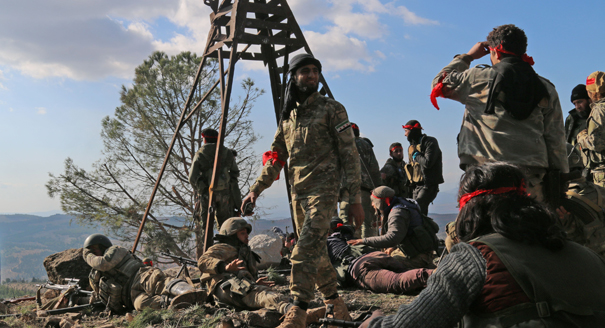On January 20, Turkey began a major military operation in the northern Syrian district of Afrin against the People’s Protection Units (YPG), the armed wing of the Democratic Union Party, a Syrian Kurdish organization. Were one to ask what the operation is really about, he or she might receive the following response: It is a trade of sorts, in which Afrin is being exchanged for Abou al-Duhour and the eastern side of the Hijaz railway in Aleppo governorate.
Indeed, Russia gave a green light to Turkey to enter Afrin, which in the future may allow Turkish-backed Syrian combatants to control the territory and take back control over certain localities, such as the Arab town of Tell Ref‘at. In return, Turkey will have to acquiesce in an effort by Russian-backed Syrian government forces to retake the town of Abou al-Duhour and its strategic airbase in Idlib governorate, as well as regain control of the eastern side of the former Hijaz railway line that runs southward from Aleppo governorate toward Damascus. The railway is out of service, however since the seventh round of talks in Astana it has become a geographical point of reference for the establishment of deescalation zones.
The current Russian-Turkish understanding draws new boundaries between both sides and confines the Syrian regime to fighting in areas outside the agreed deescalation zones. There seems to be no mutual assistance involved. Each military force will have to take on its enemy alone. The result is a land swap out of a colonial-era textbook, in which non-state actors—the YPG in Afrin and the Al-Qa‘eda-linked Hay’at Tahir al-Sham in Idlib—will have to pay a price by vacating areas that they now hold.
Strategically, this adjustment in current boundaries is very significant for both sides. For the Syrian regime, controlling Abou al-Duhour airbase is vital for future operations in Idlib governorate. In fact, the sixteen-square-kilometer base, equipped with 20 fortified aircraft shelters, is strategically situated at the intersection of Aleppo, Hama, and Idlib governorates. Its location in the middle of flat terrain means that any efforts to capture the base may last for months. Indeed, when the regime lost the airbase in 2015 to Hay’at Tahrir al-Sham, it only did so after a two-year siege and many costly attempts to take it over.
At the same time, controlling the eastern side of the Hijaz railway line would bring the regime a step closer to its ultimate goal of regaining control of the international highway linking Aleppo to Damascus and the southern Syrian border. For years the highway has been at the center of fighting. Recapturing it would place the regime and Russia in a stronger position ahead of any fighting against Hay’at Tahrir al-Sham and its allies in Idlib governorate.
On the Turkish side the rationale is more comprehensive, and perhaps overambitious. Driving the YPG southwards, away from the Turkish borders, would decrease the group’s ability to support Kurdish rebels in Turkey. Ankara considers Afrin a focal point for cross-border connections among Iraq, Syria, and Turkey. As the Turkish analyst Omer Özkizilcik wrote recently, “a safe zone around Afrin would also prevent the YPG from connecting its Syrian cantons of Jazira and Kobani with the isolated canton of Afrin, thereby obstructing plans to establish a corridor that runs from Iraqi Kurdistan to the Mediterranean Sea.”
The Afrin operation has also exacerbated Turkey’s relations with the United States. Washington is engaged in building up the capacity of Kurdish forces in Syria in order to counter Iran’s influence after the defeat of the Islamic State. Further escalation may occur if the Kurdistan Workers Party, a Turkish Kurdish party that Ankara considers a terrorist organization, and the YPG, with which it is affiliated, decide to organize attacks on Turkish soil in retaliation for the operation in Afrin. If this were to occur, it would only increase pressure on the United States to withdraw its military presence from eastern Syria and end its support for the YPG. If the Trump administration chose not to do so, U.S.-Turkish tensions would rise, pushing Ankara to strengthen relations with Russia.
The refugee issue is also on the table. Addressing local officials last week, Turkish President Recep Tayyip Erdogan said that Ankara would first “destroy the terrorists” and then allow the 3.5 million Syrian refugees in Turkey to return to Afrin in safety. This figure is actually the total number of registered Syrian refugees in Turkey. Erdogan was likely exaggerating matters for internal political consumption. Judging from Turkey’s past efforts to return refugees to Syria, it’s difficult to be as optimistic. Following Turkey’s Euphrates Shield operation, only 75,000 refugees returned to the safety zone established by the Turkish army in Syria, when expectations had been for a much higher number. The most feasible plan could be for the return of thousands of refugees to Tell Ref‘at, if the town is retaken from the YPG and rebuilt.
By virtue of the fact that it hosts the largest Syrian refugee population in the region, and now has control over an enclave in which non-jihadi Syrian opposition groups are deployed, Turkey has earned major leverage in any peace talks, across from Russia, Iran, and what’s left of the Syrian regime. Given that talks hosted by Russia have produced only military understandings, the recent land swap involving Afrin and Abou al-Duhour as well as the eastern side of the Hijaz railway could set the foundation for similar future deals. As a consequence, the Turkish and Russian spheres of influence in Syria may expand.










